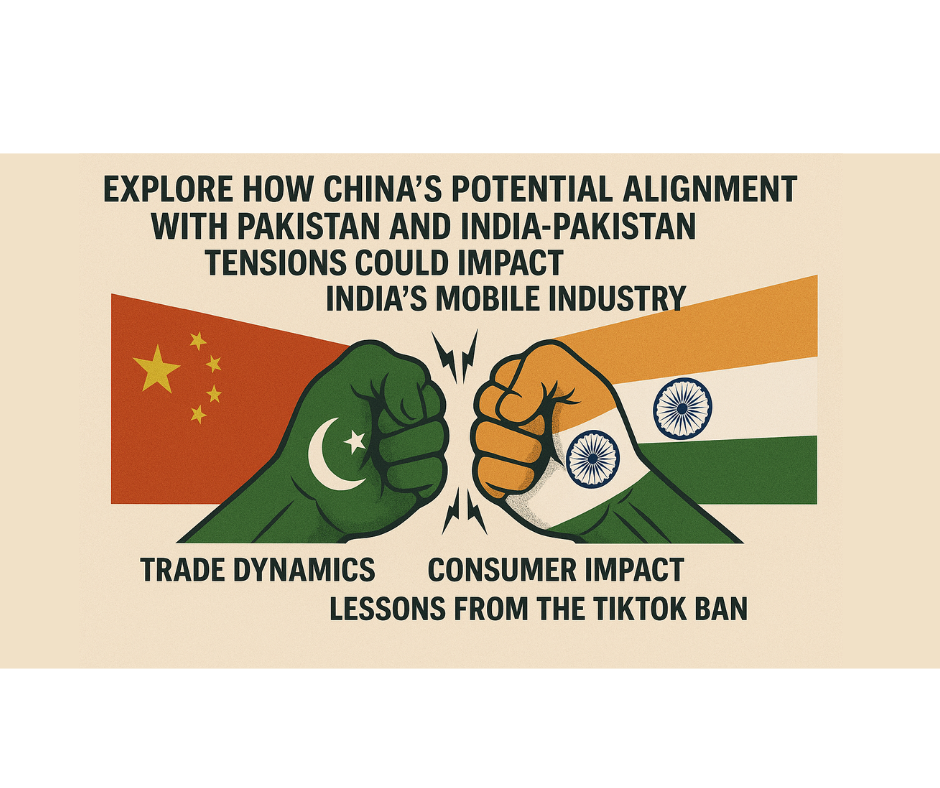Impact of India-Pakistan Tensions on Mobile handset industry
India's Mobile Industry, China’s Role, and the Impact of India-Pakistan Tensions
How the India-Pakistan Conflict Shapes Trade Dynamics
The rivalry between India and Pakistan runs deep, fueled by decades of conflict since the partition in 1947. Each confrontation, from the Kashmir issue to the Kargil War, has left emotional scars that unite Indians in solidarity during periods of tension. This collective sentiment often influences national policy, public opinion, and even trade, as the two nations remain at loggerheads.
This complex dynamic becomes even more stratified when another major power like China enters the equation. Historically aligned with Pakistan, China’s positioning in a potential conflict raises critical questions about its impact on India’s economy, particularly when it comes to industries like electronics.
What Happens If China Backs Pakistan Openly?
China’s strong strategic partnership with Pakistan isn’t new. Its investment in the China-Pakistan Economic Corridor (CPEC), arms trade, and symbolic support to Pakistani causes already indicate a close alliance. However, if China were to support Pakistan openly during heightened tensions with India, the effects on foreign trade would be swift and severe.
India imports a massive amount of goods from China, especially smartphones and electronic components. Brands like Xiaomi, Oppo, Vivo, and OnePlus dominate India’s mobile handset industry, collectively holding over 70% market share. If geopolitical tensions flare, India could retaliate with measures like bans or restrictions on Chinese brands, similar to its TikTok ban after the 2020 India-China border skirmishes.
TikTok Ban Sets the Stage
India’s 2020 ban on TikTok, citing security concerns, serves as a case study in how political conflicts impact business. TikTok had over 200 million active users in India, making it an integral part of digital culture. Yet, the ban not only cut off revenue for Chinese parent company ByteDance but also signaled India’s readiness to take drastic steps in the face of national security threats.
If a similar strategy is employed against Chinese smartphone companies due to China’s alignment with Pakistan, it could upend the industry. Locally, consumers in India’s budget and midrange segments would face limited choices and likely higher prices for smartphones. Internationally, Chinese manufacturers relying on India’s vast market would be hit hard, potentially disrupting global supply chains.
Impact on India's Mobile Handset Industry
India’s dependency on Chinese smartphones presents a challenge amid geopolitical conflicts. If tensions escalate and actions are taken against these brands, it could create opportunities for Indian companies like Micromax and Lava. However, these brands would need significant upgrades in product innovation and scale to compete effectively.
Global companies like Samsung or Apple might also gain an edge in market share but at higher price points, leaving budget-conscious Indian consumers at a disadvantage. Supply chain disruptions for Chinese factories could further strain the global electronics network, creating a ripple effect on economies reliant on exports to India.
Balancing National Sentiment with Economic Realities
India’s response to heightened tensions with Pakistan, particularly if China becomes openly involved, will need careful calibration. While emotional sentiments and national security concerns cannot be disregarded, the economic dependency on affordable Chinese electronic goods poses a significant dilemma.
Banning or restricting Chinese smartphone brands without robust alternatives risks disrupting communication access for millions of Indians, especially in lower-income groups. India will need to strike a balance between protecting its security interests and ensuring economic stability.
Key Takeaways
- If China openly supports Pakistan, India could respond with trade restrictions targeting Chinese goods, including smartphones.
- Lessons from the TikTok ban suggest that geopolitical tensions have the potential to disrupt business significantly.
- Chinese brands dominate India’s mobile handset market, making this industry particularly vulnerable during political conflicts.
- Domestic and non-Chinese brands might fill the gap, but consumers in India may face higher costs and fewer options.
- Striking a balance between nationalist sentiment and economic pragmatism will be pivotal for India.



